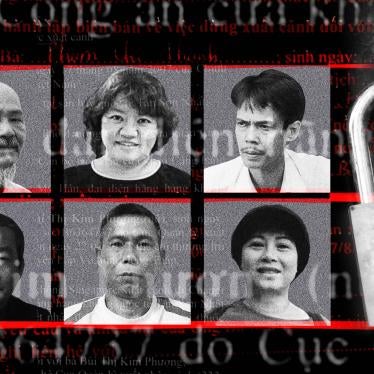(New York) – Vietnamese authorities should immediately release the blogger Pham Minh Hoang and vacate the verdict against him when his case comes up on appeal, Human Rights Watch said today. His appeals case is to be heard by the People’s Supreme Court in Ho Chi Minh City on November 29, 2011.
Pham Minh Hoang, 56, who blogs under the pen name Phan Kien Quoc, was convicted on August 10, on charges of “conducting activities to subvert the administration,” under article 79 of the penal code. He was sentenced to three years in prison, to be followed by three years on probation.
“Vietnam keeps its chokehold on free expression by using vaguely-worded national security laws to imprison peaceful activists,” said Phil Robertson, deputy Asia director at Human Rights Watch. “Peaceful activists like Pham Minh Hoang deserve to be heard by their fellow citizens, not silenced by the courts.”
By criminalizing peaceful dissent, Vietnam violates its obligations as a state party to the International Covenant on Civil and Political Rights and fails to follow Vietnam’s own constitution, which guarantees freedom of expression and freedom of association.
Pham Minh Hoang was born in Vung Tau in what is now Ba Ria-Vung Tau province and went to France to study in 1973. He returned to Vietnam as a French citizen in 2000 and taught applied science at the Ho Chi Minh City Polytechnic University. In his blog, he has written about a variety of social and political issues in Vietnam. He has advocated respecting workers’ rights and human rights and promoted national reconciliation, freedom of expression, and democracy.
He was arrested on August 13, 2010, for his alleged affiliation with the outlawed party Viet Tan, a group that once espoused rebellion against the communist government but later changed its approach for peaceful means. There is no evidence that Pham Minh Hoang has advocated or participated in violent action against the government. According to state media, Pham Minh Hoang wrote “33 articles that distort the policies and guidelines of the Party and the State.”
“Promoting human rights and basic freedoms should not be a crime,” Robertson said. “It’s clear that Pham Minh Hoang was convicted solely for expressing peaceful political beliefs and that he should never have been imprisoned in the first place.”
Vietnam is currently negotiating to join the Trans-Pacific Partnership (TPP), a major multilateral free trade agreement with key trading partners in Asia and North America.
“The US and other TPP partner governments should pressure Vietnam to improve its human rights record by releasing all prisoners convicted of crimes merely because the government disapproves of their peaceful beliefs,” Robertson said.
The following is a sample of Pham Minh Hoang’s work under the pen name Phan Kien Quoc, from a blog post entitled “Political stability and economic development: the price we pay”:
For a long time, Vietnam’s human labor has been among the cheapest in the world. This has attracted many investors, primarily for labor-intensive industries. Now, Vietnam has become a big processing [country] in the region. The consequence of cheap labor is that the life of the worker becomes worse and worse. This leads to disputes, conflicts and collective work stoppages.
If the state does not have a mechanism to protect laborers and keeps running after growth statistics, these conflicts will never end. Vietnam will never get rid of the processing status with its usual risk, uncertainty and dependency.
Workers and peasants are not the only victims of the cost of political stability and economic growth. Another serious harm is environmental pollution, which has been and will continue to destroy the health of millions of people in the months and years to come.






